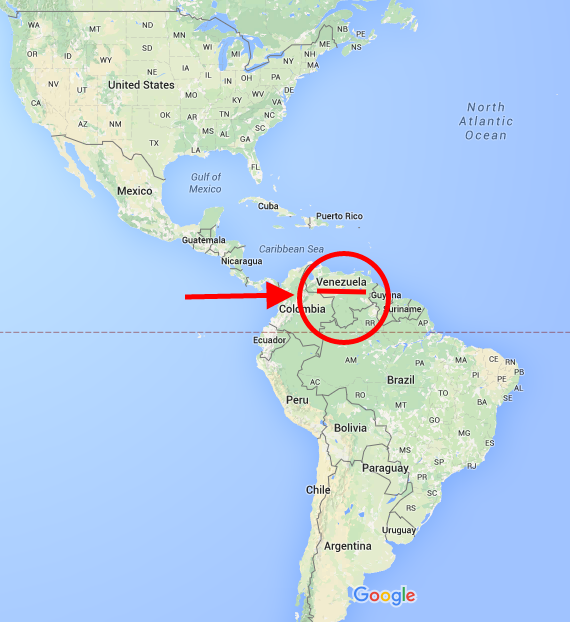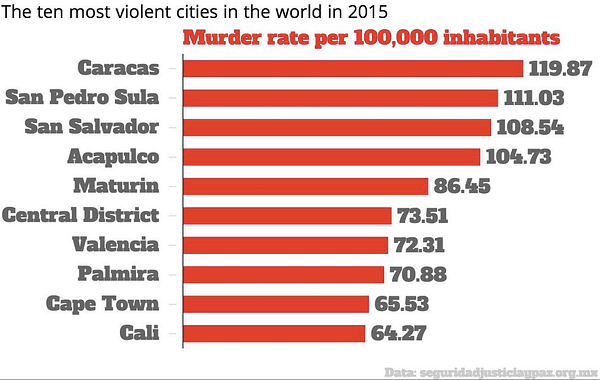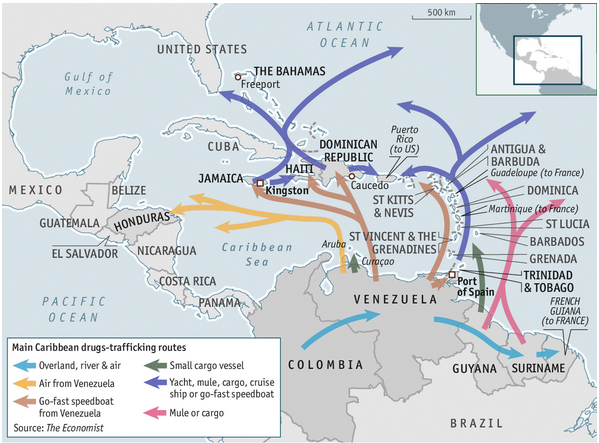9 things you probably didn’t know about Venezuela
By Alek Boyd

1. Where is it? South America.
2. How big is it? Bit bigger than Texas.
3. Why should I be concerned?Most of the cocaine consumed in the U.S. is sent via Venezuela and the trafficking of drugs is sponsored by the government. In fact, close relatives of the current president, Nicolas Maduro, were arrested for attempting to transport 800 kilograms of cocaine into the U.S.

4. How is it like to live there? Of the top ten most dangerous cities in the world, Venezuela has three: Caracas, no. 1 in the list, with a murder rate of 119.87 per 100,000 inhabitants; Maturin, no. 5 in the list, with a murder rate of 86.45 per 100,000 inhabitants; and Valencia, no. 7 in the list, with a murder rate of 72.31 per 100,000 inhabitants. The NGO Observatory of Venezuelan Violence reported that there were 27,875 violent deaths in 2015 in Venezuela.

Due to a nationalization wave,Venezuela ran out of toilet paper and other staples. In fact, Venezuela is facing an unprecedented humanitarian crisis not only caused by food shortages, but reportedly is also in urgent need of foreign medical aid.
5. What does Venezuela produce? 95% of export earnings of the government of Venezuela come from oil, which is sold in the U.S. through CITGO branded fuel stations.Petroleos de Venezuela (PDVSA, pronounced “ped-ə-VES-ə”), the State-owned conglomerate, is CITGO’s parent company. Due to government corruption and theft, and despite oil income in excess of $1 trillion since 1999, Venezuelans face extreme levels of poverty and an inflation rate of 720%.
6. Where can Venezuelans get redress? Nowhere. The Supreme Court and the judiciary are but appendixes of the government. The Supreme Court voided all acts of Congress. In fact, it has not produced a single ruling or sentence against the government in over 45,000 cases dealt with in the last 15 years. Corruption on an industrial scale, which is a defining characteristic of the government, is never investigated, unless to punish political opponents, or those fallen out of favor.
Leopoldo Lopez was sentenced to nearly 14 years on trump charges. The prosecutor in charge would later flee to the U.S. to request political asylum.
7. How about political prisoners? There are hundreds. The most notorious one being opposition leader Leopoldo Lopez. Stories of less known ones,who have taken their lives while imprisoned, are truly horrendous. Critics of the government, like Antonio Ledezma, are faced with over 20 years of wrongful imprisonment, while others are constantly harassed.
8. What about the media? Some media owners have had theirhouses raided. Others have hadbroadcasting licenses summarily revoked and equipment stolen. In some cases, homes of investigative journalists have been broken into, laptops have been stolen and children have been threatened by what appears as government-sanctioned terrorism. The state of the media in Venezuela was best summed up by Freedom House:
Censorship and self-censorship are pervasive in radio, television, and print. The nongovernmental media watchdog Press and Society Institute (IPYS) found that in 2014, nearly one-third of the nation’s journalists declined to report information of vital public interest in order to protect their personal security, and more than 40 percent reported being pressured by authorities to change their coverage of a story. During the 2014 demonstrations, the government blocked or disabled hundreds of websites and made images of injured protesters inaccessible on Twitter. Mobile-phone applications used by demonstrators to organize, such as Zello and Tunnel Bear, were also blocked. In the interior state of Táchira, CANTV, a state-owned telecommunications company, blocked broadband internet service for 30 hours.
Murders of journalists are relatively rare in Venezuela, and no journalists were killed as a result of their work in 2014. However, IPYS documented 347 attacks on journalists during the year, including arbitrary detentions, harassment, and physical violence against reporters covering the protests. While government security forces were responsible for the bulk of these attacks, including an incident in May in which two journalists were shot while covering a demonstration in Caracas, at least 38 journalists reported being attacked by armed civilian groups. Journalists who criticize the Maduro government or its policies are also subject to smear campaigns, arbitrary arrests, and physical attacks by authorities.
9. Are human, civil and political rights respected in Venezuela? Not. At. All.
In fact, the Inter American Commission of Human Rights has, since 2003, consistently placed Venezuela in Chapter IV, a category reserved to countries where rights are systematically violated as State policy.
I have been researching and writing about corruption since 2002: first invcrisis.com, then in blogger.com, Semana (Colombia), El País (Spain), La Prensa (Panama), Tax Justice Network, etc. The last site I launched, infodio.com, wascensored by the Venezuelan regime in January 2014. You can follow me onTwitter and Medium.
Etiquetas: Alek Boyd, narcotráfico










0 Comments:
Publicar un comentario
<< Home